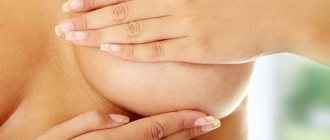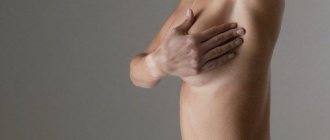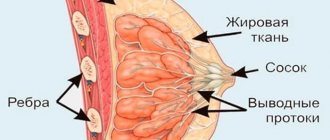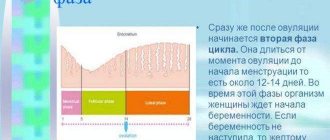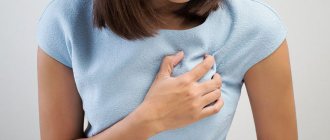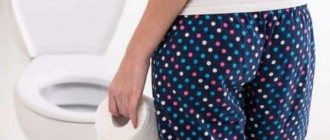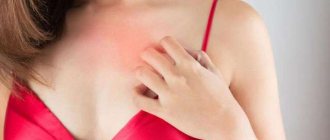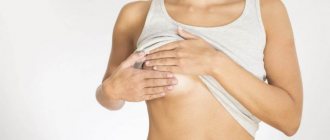Many women are interested in why their breasts become enlarged, swollen and sore before menstruation. Each girl undergoes changes in her body before her period, so she may feel some discomfort and inconvenience. Pain can often be felt in the chest.
Before menstruation, breasts may enlarge, change shape, the color of the nipples may change, such changes can occur a week or two before the start of expected bleeding. However, after the end of menstruation, the breasts should take their previous shape and the soreness will disappear. If this does not happen, you need to urgently visit a mammologist.
Breast augmentation on the eve of menstruation
Before the onset of menstrual flow, women observe certain temporary transformations in their bodies.
They are invisible to others, but very noticeable for each individual representative of the fair sex. In particular, before critical days, the volume of the mammary glands changes briefly, causing discomfort and pain to the woman. So, from one to two weeks before the start of menstruation, breasts may change shape and size (increasing), as well as the color of the nipples. With the onset of menstruation or after its end, the appearance of the breast takes on its usual shape. If a reverse change does not occur after the end of menstrual flow, the woman needs to urgently contact a mammologist. Further, the article discusses the main reasons why breasts swell and enlarge before menstruation, what reasons there may be for breast enlargement before menstruation, what to do if breasts become enlarged before menstruation and are very painful. Most often, breast enlargement is observed 1 week before the start of menstruation; 7, maximum 10 days before the start of menstruation, female breasts can increase in size and swell.
Drug treatment
There is no special treatment for breast tenderness before menstruation. The following drugs and methods will help relieve discomfort:
Anti-inflammatory non-steroidal drugs.- Hormonal contraceptives (some have the opposite effect and will worsen the condition).
- Taking magnesium supplements a week before your period starts will reduce pain.
- To avoid malfunction, in addition to magnesium, it is important to take phosphorus and calcium.
- Taking vitamins - a week before the onset of menstruation, you need to support the body with vitamins B6 and B12.
- Strengthen the menu with meat and dairy products, eggs, herring, herbs, dates.
- Sports will relieve painful conditions during menstruation. Aerobics, walking, swimming, dancing help (especially belly dancing, which involves the pelvic organs and nourishes them well with oxygen).
- Taking a warm bath helps reduce muscle tone and relax them.
- Massage of the mammary glands is necessary before menstruation for normal blood flow and prevention of painful manifestations.
Self-medication is dangerous; start taking medications after consulting a doctor.
A week before your period, your chest hurts and causes discomfort - you can’t play sports, because any movement causes discomfort in the chest. To alleviate this condition, take herbal teas with anti-inflammatory and calming effects. The following herbs will help with painful discomfort:
- series;
- nettle;
- dandelion root;
- celandine;
- Tartar;
- St. John's wort.
Symptoms of breast swelling before menstruation
To understand why breasts become enlarged and painful before menstruation, you first need to understand what the main symptoms and signs of breast swelling exist.
- Mastalgia (increased sensitivity and pain from touch, swelling);
- There is a feeling of heaviness in the mammary glands, aching pain occurs;
- In addition to the chest, pain may occur in the abdominal area;
- As a result of the rush of blood, painful sensations may occur in the area of the areola and nipples;
- The breast may be distinguished by the presence of minor indurations.
In addition, there may be several specific factors that result in pain in the chest area. These factors include wearing tight clothing, problems with blood microcirculation, frequent fatigue, stressful situations, taking foods that can retain fluid in the body, taking certain medications and much more.
What is mastodynia
Mastodynia is a natural change that occurs in the breasts immediately before menstruation. This is due to the fact that with premenstrual syndrome, the body's protective functions are reduced. The condition is additionally accompanied by the following negative signs:
- frequent mood changes;
- excessive fatigue throughout the day;
- pulling painful sensation in the lower abdomen;
- swelling;
In addition to breast enlargement, girls often complain of fatigue before menstruation.
- hot flashes;
- excessive sweating.
According to statistics, about 70% of women of childbearing age experience increased sensitivity in the breasts before their period.
Monthly changes in the body should not frighten or alarm you. Usually a woman does not need additional treatment.
Why do breasts enlarge, reasons for swelling and enlargement of breasts before menstruation (menstruation)?
The reasons why a woman's mammary glands enlarge before menstruation are very varied, but in most cases such symptoms do not indicate the development of any health problems. The female body is designed in such a way that, under the influence of hormonal changes characteristic of different phases of the menstrual cycle, it undergoes constant physiological transformations. So, before menstruation, before the onset of menstruation, not only discomfort and pain in the chest may appear, but the breasts may increase in size, and pain in the nipple area may be accompanied by an increase in their halos. Such changes are influenced by prolactin, progesterone and estrogen. These hormones are produced over a significant period of a woman’s life, and at each stage of the body’s development they have a different concentration rate.
It is important for women to remember that if before menstruation the breasts have enlarged, but after their end they have not acquired their usual size, then there is a reason to consult a doctor, especially in the case when breast enlargement is accompanied by pain in the breast.
Breast enlargement in women during the premenstrual period is considered normal, even swelling and pain in the breast area before the onset of menstruation can be normal if such symptoms and signs of PMS are repeated every month and the chest pain is not severe. These days there is an increase in tissue and swelling of the mammary glands. An additional factor contributing to breast enlargement during menstruation is the retention of fluid by body tissues during the luteal phase of the cycle. Thus, the breasts become a little larger and gain increased sensitivity.
Water retention in the body before menstruation helps the body comfortably adjust to the proliferation necessary to create and maintain favorable conditions for the egg in the event of its fertilization. During each menstrual cycle, a woman’s hormonal system prepares the body for conception and bearing offspring. Therefore, breast enlargement, swelling in this area, discomfort and even pain in the nipples or pain in the chest area are a natural sign of imminent menstruation. Significant breast enlargement during menstruation may indicate pregnancy. Each case must be considered individually, since the hormonal background of each individual woman is unique.
When you need to urgently visit a doctor
- unusual lumps are felt in the chest;
- you cannot palpate your breasts yourself;
- age over 40 years and the woman has never been to a mammologist;
- brown, unusual discharge from the nipple;
- inconvenience and pain are such that a woman cannot lead a normal life.
Enlargement of the mammary glands before menstruation is a normal natural process, but there are exceptions to the rule when such signs indicate the presence of a pathology that can lead to serious consequences.
Therefore, dear women, listen to your body, especially after menstruation. If your breasts still become swollen and tender, see your doctor.
The influence of hormones on the menstrual cycle
The reasons for breast enlargement before menstruation can be explained by natural physiological reasons that appear as a result of hormonal changes, which in turn are a natural process of changes in the female body before the onset of menstruation. Therefore, in most cases, breast enlargement and swelling, nipple pain and pain in the chest area before menstruation are absolutely natural signs and symptoms of PMS, premenstrual syndrome. After ovulation, the level of progesterone in a woman’s blood increases. Its amount does not decrease until the body understands that fertilization of the egg has not occurred this time. Once the lack of conception is accepted by the body, progesterone levels drop sharply. Before menstruation, progesterone and estrogen have the lowest concentration levels in a woman’s blood.
Breast tenderness coincides with the maximum concentration of progesterone.
This phenomenon is one of the components of premenstrual syndrome, when before menstruation (menstruation) the breasts enlarge and their shape changes.
However, if some women suffer from it every cycle, others can only guess about its existence. Women who do not experience symptoms of PMS may also experience breast enlargement before their period. For them, the cause of this phenomenon is constant stress and overwork, the influence on the activity of the hormonal system of medications, especially hormonal contraceptives, wearing tight underwear that interferes with blood circulation, addiction to foods that allow fluid to be retained in the tissues or accompanying swelling, for example, salty and fatty dishes or with coffee.
How does the mammary gland work?
The main functional unit of glandular tissue is the lobule, which consists of tubular glands and excretory ducts. The lobular ducts merge to form the lobular ducts. Thus, the mammary gland is something like a bunch of grapes, where the grapes are segments and the branches are ducts. Small ducts merge into larger ones - lobar ducts, and they, in turn, follow to the nipple.
Directly behind the nipple, the ducts widen to form lacteal sinuses , which collect milk. The ducts then open on the nipple in the form of several holes. Knowing this feature, you can understand how to properly express your breasts manually during lactation: by pressing your fingers on the areola area (expressing the contents of the sinuses), but without exerting any force on the base of the breast.
The nipple is surrounded by pigmented skin (areola). During pregnancy, “tubercles” become clearly visible on the skin of the areola - these are the Montgomery glands. They are modified sebaceous glands that protect the nipple from drying out and infections during feeding.
It is also important to know the routes of lymph outflow from different parts of the mammary gland. Lymph drainage mostly occurs in the axillary lymph nodes. From the internal sections (those located closer to the middle of the chest), lymph flows into the sub- and supraclavicular lymph nodes (the latter can be felt above the collarbone) and into the lymph nodes located in the chest cavity (parasternal).
Rarely, with breast cancer, when the above groups of regional lymph nodes are affected, tumor metastases with lymph flow can enter the inguinal, axillary, sub- and supraclavicular, parasternal lymph nodes on the side opposite to the lesion.
When is breast enlargement before menstruation dangerous or a sign of pathology?
There are also dangerous factors that contribute to breast enlargement. Breast augmentation before menstrual periods deserves attention if, after their completion, they have not returned to their normal size, and the owner feels pain and lumps. Such symptoms can signal pathologies, including gynecological diseases, thrombophlebitis, benign and malignant tumor processes, disorders of the thyroid gland and adrenal glands, cysts, abscesses and nodes, as well as inflammatory processes in the chest.
At any stage of the menstrual cycle, a woman should pay attention to changes in the functioning of her body, and if deviations are observed, in particular, manifested in pain or the appearance of lumps in the mammary glands, uncharacteristic enlargement, immediately consult a mammologist or gynecologist for diagnosis possible violations.
What diseases can be diagnosed
Additional pathological signs may indicate the presence of diseases. In this case, there is foreign discharge from the chest. The mammary gland is deformed. The disorder may affect only one breast.
The listed symptoms require contacting a doctor. A woman may be diagnosed with mastitis. Usually the condition appears in girls who refuse breastfeeding. The chest swells and becomes hot. There is intense pain syndrome.
Mastitis can affect either one mammary gland or two at once. The breast becomes hard to the touch. Sometimes you can't touch her.
Uterine fibroids can also cause pain. This neoplasm is benign. In the initial stages, the signs present can easily be confused with pregnancy. When sick, the menstrual cycle is disrupted. Menstruation either disappears completely or, on the contrary, continues constantly.
One of the possible pathologies in this case is an ovarian cyst.
A woman may also be diagnosed with ovarian cysts. In this case, pain appears in the lower part of the abdominal cavity. The pain gradually intensifies. Sensitivity also affects the breast.
What to do if you have chest pain before your period, your breasts hurt and swell?
If a woman does not know what to do, if her breasts hurt and become enlarged or swell before menstruation, then the following tips may be useful to her. You can reduce the feeling of discomfort in the mammary glands before the onset of menstruation without outside help. To relieve or reduce pain and swelling of the breasts before menstruation, it is necessary to refrain from drinking too much fluid, avoid underwear with hard inserts or underwires, do not squeeze the breasts, and adhere to the rules of a healthy lifestyle and proper nutrition.
The premenstrual period subjects a woman's body to temporary physiological transformations. This course of things is normal; after the onset of menstruation, the body takes on its usual shapes and outlines. If pregnancy occurs or pathologies develop, reverse changes may not occur. Therefore, at any stage of the cycle, a woman needs to be attentive to the processes occurring in her body in order to be able to timely identify possible diseases, treat them and prevent complications.
Prevention measures
Other reasons why the mammary glands swell before menstruation are pain and swelling in the mammary glands, which are not associated with hormonal surges and disruptions. The provocateurs are:
- drinking plenty of water;
- taking hormonal contraceptives;
- eating over-salted food;
- uncomfortable underwear of small size;
- abuse of coffee and strong tea;
- surgical intervention;
- injury to glandular tissue;
- pathology of the reproductive system.
It is possible to reduce the pain and intensity of swelling of the mammary glands. You need to follow simple rules:
- refuse a bra with underwires;
- reduce the consumption of caffeinated drinks;
- take a limited amount of fluid before menstruation;
- practice proper nutrition;
- avoid stressful situations, cold and drafts;
- do physical education;
- For unbearable pain, use painkillers.
It is important for women to monitor the condition of their mammary glands before menstruation. Only a woman knows her body and feels changes in it. Monitor the size of the glands and the intensity of pain. Conduct a breast self-examination several times a month. For any deviations, consult a doctor. Even without any abnormalities or discomfort, a woman needs to be examined by a mammologist every six months.
What to do to get rid of chest pain, swelling and discomfort?
If a woman does not know how to get rid of chest pain when the breasts swell before menstruation, before the start of menstruation, then the tips listed below may be useful to her. There are also a number of specific recommendations, following which you can achieve a reduction in pain in the chest area, as well as discomfort:
- Fatty foods should be absent from the diet. When eating a low-fat meal, there is improvement in heart function, overall health of the intestines and chest, and weight loss. You should not take chocolate, tea and coffee in large quantities;
- You should not take salt ten days before your expected period. Exercise daily;
- To achieve an ideal breast shape, it is recommended to wear a bra for days. You can use a special sports version. To make it easier, you can resort to using a compress, but you cannot apply them directly to the skin of the chest; it is better to apply a towel first and only then the compress;
- To relieve pain, it is recommended to take aspirin or ibuprofen, since they do not contain caffeine;
- Breathing exercises can reduce stress levels; a similar effect can be achieved with daily walks, relaxing baths, etc.;
- It is recommended to resort, for example, to natural diuretics, for example, cucumbers, parsley or celery;
- Taking diuretics before menstruation makes it possible to reduce pain and swelling of the breasts.
If we talk about the beneficial properties of vitamins B6 and E, a rather controversial issue arises regarding their intake. In this case, it is recommended to consult a specialist; in addition, he may prescribe various medications that will reduce unpleasant symptoms. At the same time, you should not self-medicate, as this can only aggravate the situation.
If your breasts swell before your period, these symptoms are often accompanied by chest pain or painful discomfort. Moreover, soreness in the breasts, pain in the nipple area or severe pain in the chest, all these symptoms, as a rule, appear in the 2nd phase of a woman’s menstrual cycle. If pain in the chest area is observed constantly and is one of the main symptoms and signs of the development of PMS, then there is no need to worry. But if chest pain appears suddenly or appears periodically, then it is better to be examined by a gynecologist. And about the causes of chest pain after menstruation, you can read in the article: why do breasts hurt after menstruation, causes of breast pain in the mammary glands after menstruation.
How to reduce the intensity of discomfort
If there are physiological causes of discomfort, it is easy to cope with pain. Women are recommended:
- Healthy food;
- wear loose clothing;
- give preference to high-quality underwear.
To prevent the symptom, preference should be given to traditional medicine. You should start drinking decoctions approximately in the middle of the menstrual cycle. Women are often recommended to use the following to prevent pain:
- nettle;
- chamomile;
- lemon balm;
- sequence;
- St. John's wort;
- celandine.
Take a look and learn all about the causes of chest pain:
Decoctions are prepared from the listed plants. You also need to avoid stressful situations and possible hypothermia.
When should you seek help from a doctor if your breasts are enlarged or swollen before your period?
What causes pain in the chest area? You can get the necessary answer only after consulting a doctor. A woman is advised to see a doctor if:
- New, unknown lumps have appeared in the breast area;
- You cannot perform a proper breast examination on your own;
- If you are over 40 years old and have never had a mammogram before;
- Incomprehensible brown discharge began to appear from the nipples;
- If you experience unpleasant sensations, you cannot sleep normally, and the recommendations given below turned out to be ineffective.
Going to the doctor should never be put off; it is better to immediately make sure that nothing bad is happening to you. Only diagnostics in the early stages will allow the presence of the disease to be determined correctly. In addition, you should not fall into despair after you have found out the real cause of painful sensations before the onset of your period. By contacting a professional doctor, you will definitely cope with the problem.
What is the reason for pain and swelling in the breasts before the onset of menstruation? In fact, such symptoms are considered to be quite normal, which almost all women experience. In fact, many people experience painful sensations in the chest area before the onset of menstruation, and often there is nothing dangerous about it. It occurs before the start of your period and goes away along with other symptoms, such as irritability and mood swings. But if pain in the chest area causes severe discomfort, then you need to see a doctor.
Source: womanchoise.ru
Similar articles
- Can you feel sick before your period? Causes of nausea before your period? What does nausea before menstruation mean? Nature has endowed the female sex with the most important privilege - the ability to continue the human race. The reproductive system in women depends on the lunar calendar, that is, on the phases of the moon. This explains the cyclical...
- Causes of chest pain before menstruation (menstruation) Pain in the mammary glands before the onset of menstruation is considered one of the most common symptoms of the imminent onset of menstruation. For some women, breast pain before menstruation is very severe and causes significant discomfort, but...
- Stopped hurting, breasts don’t hurt before menstruation (menstruation), reasons, what to do? Stopping chest pain before menstruation This is not an isolated case, this happens to almost every second person. Only this can manifest itself in different ways. So, some women experience mild chest pain a few weeks before...
Increased breast sensitivity
Increased breast and nipple sensitivity is another common and natural change during your period.
Should I worry?
There is a reason to visit a doctor if increased sensitivity reduces the quality of life and becomes constant chronic discomfort. It is necessary to identify the cause, as it may be associated with a pathological process in the mammary gland.
A diagram of methods for breast self-examination, which is recommended to be performed once a month after the end of menstruation.
Don't forget that breast health should always be under your control. Conduct self-examinations and show your breasts to a gynecologist at least 2 times a year.
According to statistics[1], more than half of women constantly or periodically experience chest pain before the onset of menstruation. With rare exceptions this is not a cause for alarm, but almost always a cause of discomfort. Why do unpleasant sensations occur and is it possible to get rid of them? How to make your life easier during PMS without resorting to hormonal and other serious medications? Read about it in our article.
How do girls' breasts grow during puberty?
The rudiments of the mammary glands appear around the sixth week of intrauterine development. Before puberty, the breasts are in a “dormant” state: the lobules are not yet formed, only the main ducts are present. During puberty, under the influence of estrogens, breast growth and development : the ducts begin to branch, lobules form.
At the beginning of puberty, girls may notice the appearance of dense, painful “lumps” behind the nipple. This is the beginning of breast formation. Often these “lumps” appear out of sync and make the girl and parents worry. A visit to a normal doctor puts everything in its place.
Gradually, with the formation of a stable regular menstrual cycle, the breasts acquire a mature structure: the lobules and ducts are well formed and ready for their main function.
